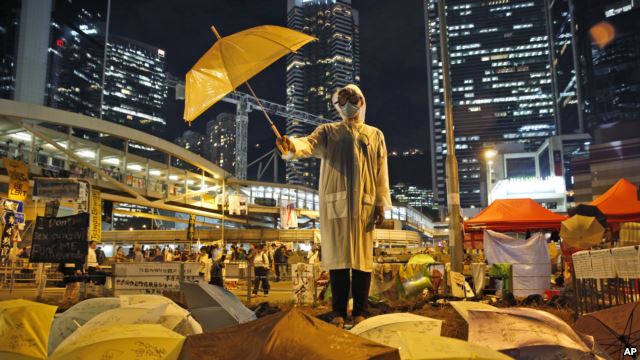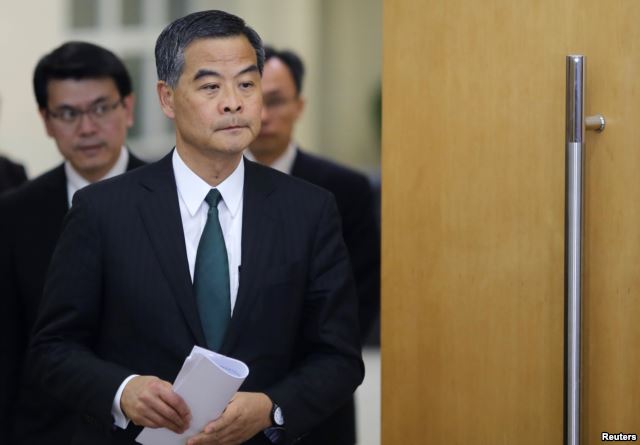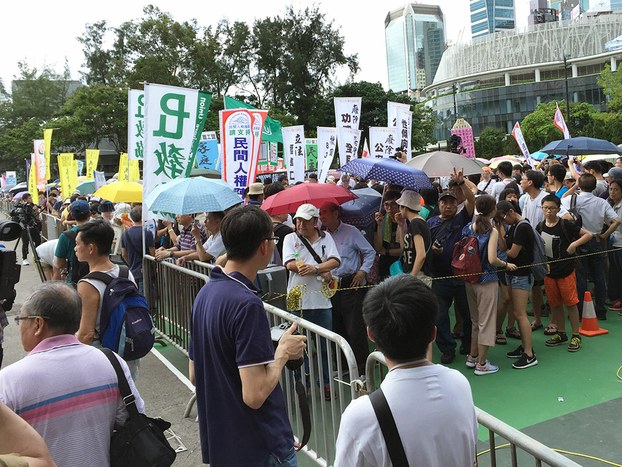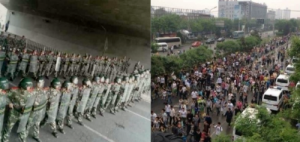
A protester holds an umbrella during a performance on a main road in the occupied areas outside government headquarters in Hong Kong’s Admiralty in Hong Kong, Oct. 9, 2014.
HONG KONG—Thousands of people will take to the streets in Hong Kong Friday for an annual protest march that has been a closely watched barometer of how the city’s seven million people feel about Beijing and their local government.Many Hong Kong residents are unhappy both with the territory’s chief executive, CY Leung, and with the central government in Beijing, to which he is perceived as beholden. The size of the march will be seen as a marker of public sentiment. The most recent public opinion survey indicates the chief executive’s approval rating at 19 percent, with 62 percent disapproving.
Organizers are giving the march a twin theme: Prevent CY Leung from getting a second term of office, and demonstrate anger over the erosion of Hong Kong’s autonomy. The latter has been highlighted by the case of five local booksellers who were taken into custody by mainland authorities and held inside China for months.
Lam Wing-kee, a bookseller who has managed to returned to Hong Kong, described his seven months in virtual solitary confinement and interrogation as “mental torture.”
Lam will lead Friday’s protest march, flanked by Ching Cheong, a journalist for Singapore’s Straits Times who spent three years in a mainland prison, and by Lau San-ching, a pro-democracy dissident who spent 10 years in jail in China after bringing books and clothing to the mainland in 1981.
Public sentiment has turned increasingly sour over the booksellers’ case, which strikes at the heart of the one-country, two-systems formula under which Hong Kong enjoys a high degree of autonomy, and personal freedoms are protected by the Common Law system and a Bill of Rights Ordinance that incorporates international rights covenants.

Hong Kong Chief Executive Leung Chun-ying arrives at a news conference.
CY Leung’s electoral mandate as chief executive derives from a 1,200-member body, largely handpicked by Beijing. This has given rise to a common nickname for him – 689 – the total number of votes he received when elected by the body in 2012. His term of office ends next year.
Jackie Hung, vice-chairperson of the Civil Human Rights Front, which organizes the annual march, told VOA they are urging the ouster of “689” and the scrapping of the “small-circle” election system that chose him.
They are also expressing concern over the erosion of Hong Kong’s promised autonomy. She said the three men leading the march were chosen because “they were imprisoned in China before, and only because they were trying to exercise their basic rights.”
Lee Cheuk-yan, a trade unionist and vice-chairman of the Labour Party, has helped organize the yearly protest since its inception.
“The theme is that CY Leung is very much kowtowing to Beijing and executing the orders from Beijing, instead of protecting the rights and freedoms of the people of Hong Kong, and also that C.Y. Leung has been causing a lot of social division — and there’s a big anger among the people of Hong Kong against this chief executive, which is very harmful for our development, very harmful for one-county, two-systems,” said Lee Cheuk-yan.
The march also takes place ahead of September’s legislative elections. Hong Kong voters elect 40 of the legislature’s 70 seats. The remaining 30 are chosen from among professional bodies (in some of these constituencies only corporations can cast ballots).
The upcoming election will include a number of new, young parties that have formed since the student-led Umbrella Movement demonstrations that paralyzed parts of central Hong Kong for 79 days in 2014.

An umbrella with pro-democracy messages above the student-led protest site in the Mong Kok district of Hong Kong, Monday, Oct. 20, 2014
One of these new parties is Demosisto, headed by two of the Umbrella Movement’s young leaders, Joshua Wong and Nathan Law. Wong is 18 years old and is deciding whether to appeal a recent court ruling that one cannot be a candidate for office until the age of 21. Law is already 21 and is widely expected to stand for the legislature.
Wong told VOA the booksellers’ case would be an important part of Demosisto’s election campaign. “What we hope is to fight for the (sic) freedom, and also it’s necessary to protect the safety of every HK people,” he said. “If the booksellers have been kidnapped, we are not sure who will be kidnapped in the future.”
Law agreed that the worry over personal security would bring more people out for the parade. Already a seasoned organizer, the budding politician also saw another reason for a large turnout.
“I believe it’s a major event for Hong Kong people to know more about the civic organizations. For each year, there are hundreds of organizations in the July 1 rally and, including myself, I am inspired by all those organizations working for human rights and democracy for Hong Kong. I believe that’s a really, really important civic education for Hong Kong people,” he said.
The size of a July 1 turnout can have real political consequence.
In 2003, more than a half-million angry citizens marched for several hours in stifling heat, eventually driving Hong Kong’s first chief executive, Tung Chee-hwa, out of office before his second five year term ended.
Source: http://www.voanews.com/content/thousands-in-hong-kong-likely-to-participate-in-annual-protest-march/3398358.html





